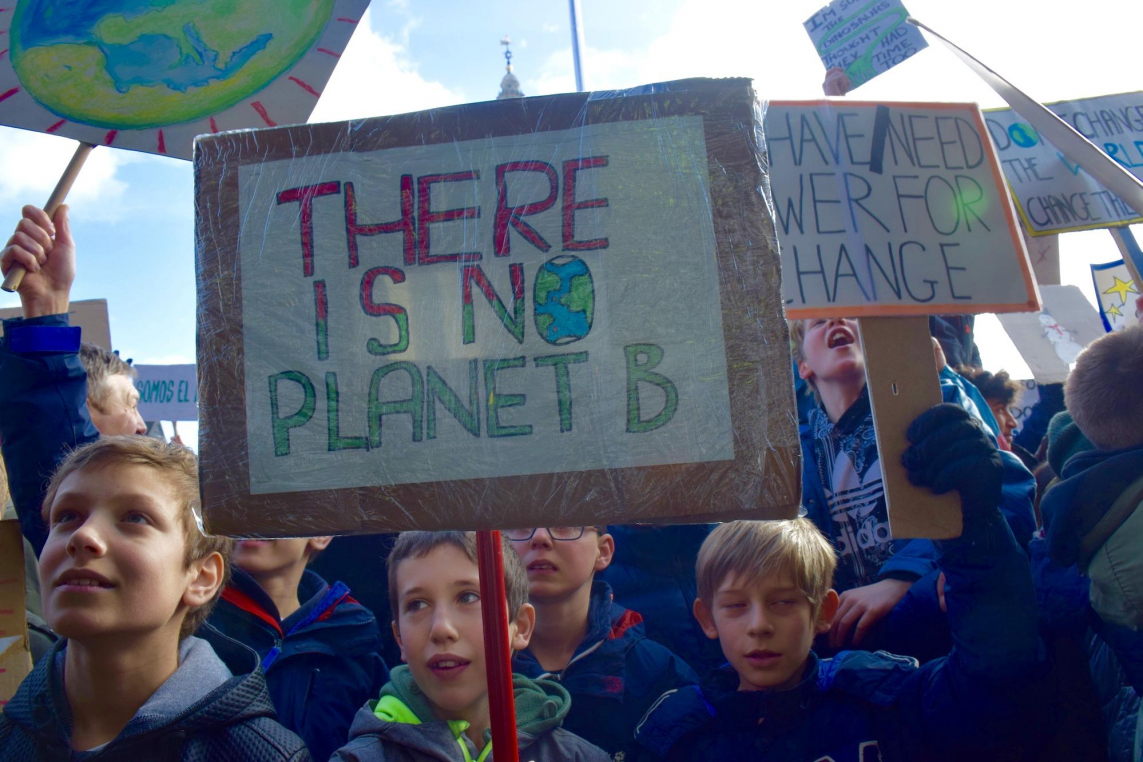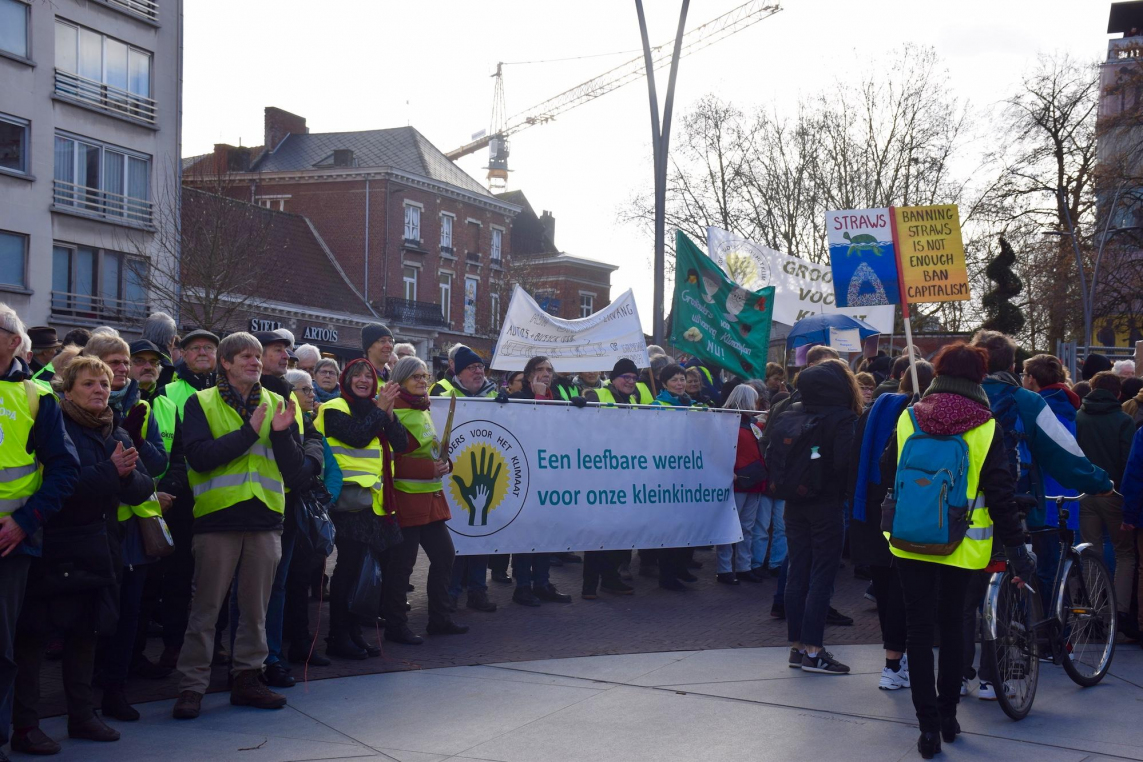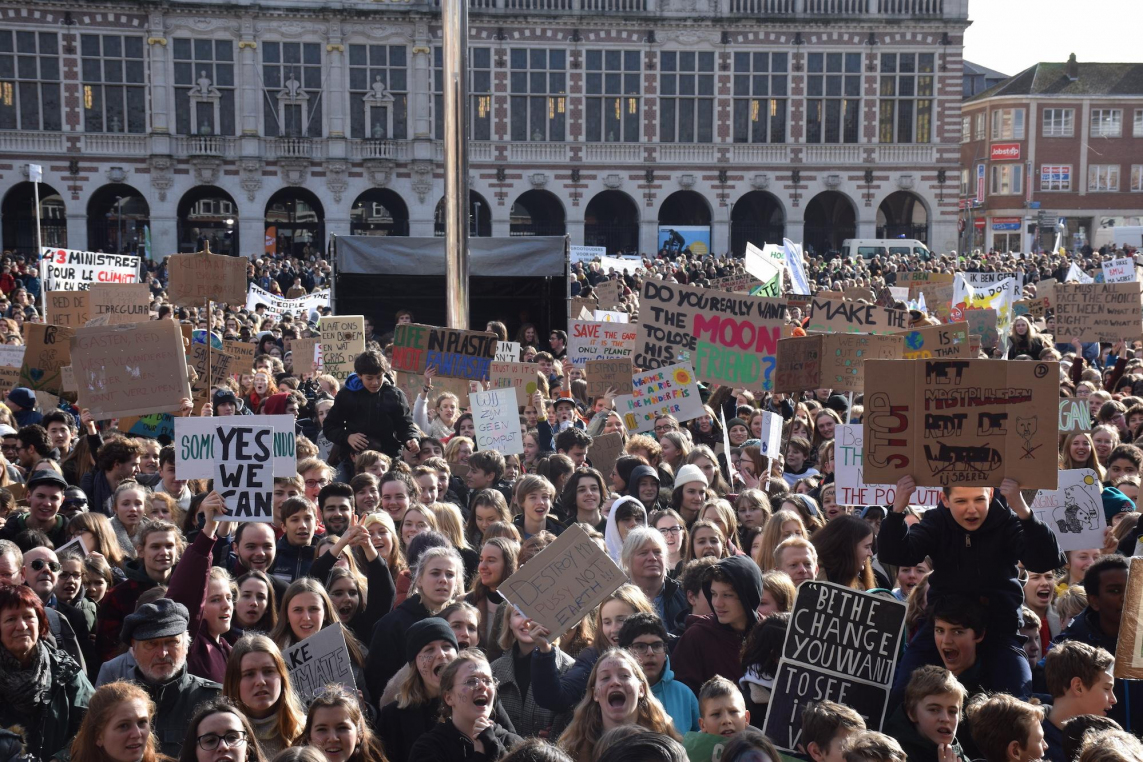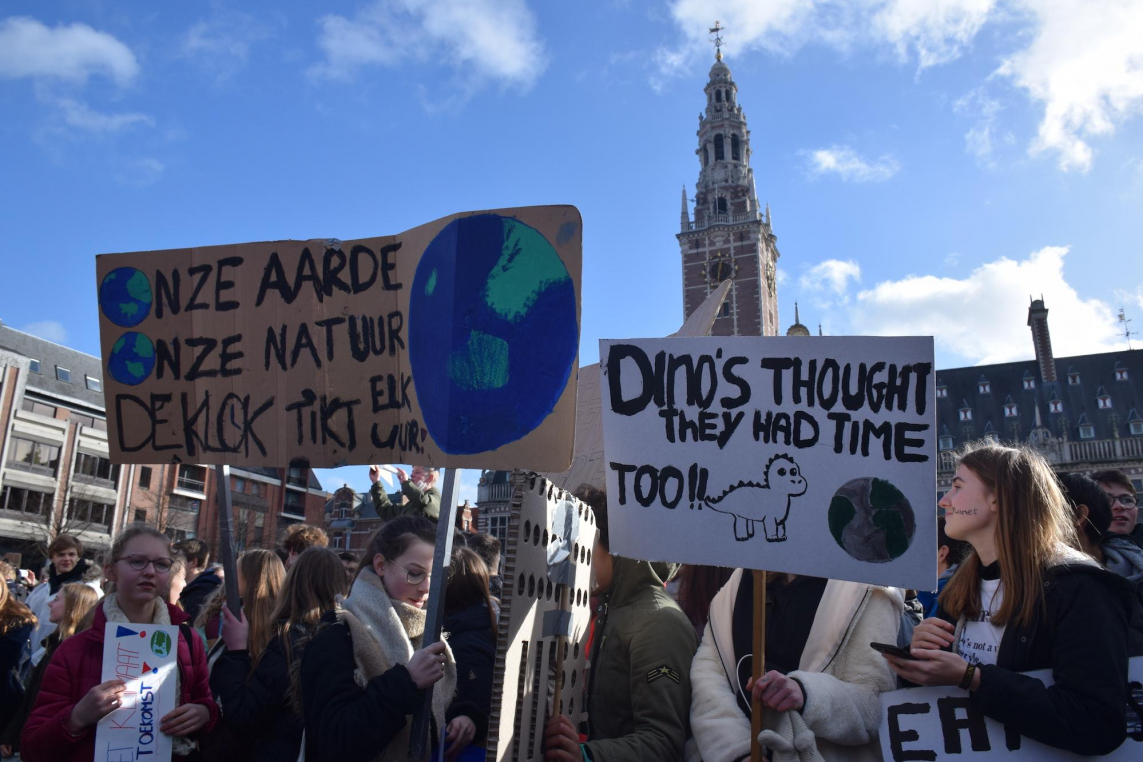‘Hope Army’ of Belgium’s Climate Activists Marches On

Luca – a 8 year old boy takes part in a student’s protest march for climate action in Leuven
(c) Stella Paul
Leuven, Belgium: It’s early afternoon on a Thursday. 8 year old Luca of Leuven should have been at school at this hour. Instead, he is walking along a narrow dirt road leading to Monseigneur Ladeuzeplein — a public square where over 10 thousand students have been gathering to voice a common concern they have: rapid warming of the planet earth.
With a placard held firmly in his tiny hands that reads ‘There is no Planet B’, the young school boy tries hard to keep pace with his fellow marchers, often breaking into a run. As a light rain begins to fall, Luca begins to raise his voice, joining others around him in chanting ‘What do we want? Climate action. When do we want it? Now!’
Cascading Effect of Protests
This is the 5th week in a row that students have skipped their schools across Belgium to protest against global warming, urging European leaders to adopt ambitious climate policies in line with goals set by the Paris agreement in 2015. The Paris climate agreement, adopted by almost 200 nations, set a goal of limiting warming to ‘well below’ a rise of 2 degrees Celsius above pre-industrial times while ‘pursuing efforts’ for a tougher goal of 1.5 degrees Celsius.
While Thursday’s march in Leuven drew 13,000 –a number relatively smaller than the previous weeks, there were demonstrations in other cities which brought the total number of students to 30,000, according to the organizers. With each passing week, more students have been joining in from more cities and more schools, collectively bolstering a growing global youth movement started last year by a 16 year old Swedish student Greta Thunberg.
Thunberg, who was seen urging world leaders to take greater climate action at at this year’s World Economic Forum in Davos, has inspired thousands of students across the globe including Germany, Switzerland, France and Australia where similar marches have taken place.

Kyra Gantois – one of the leaders of the ongoing students protests with fellow marchers
© Stella Paul
Never Too Young to Lead
Teenagers Kyra Gantois and Anuna De Wever are leading the protest movement in Belgium from the front. Fierce and dynamic, the duo addresses the protesters, reminding them that it is well within their rights to seek greater climate action. ‘We have a right to have a say in this. We care for the planet and we are the next generation, so we will decide’, says Anuna, to a thunderous cheer from the crowd.
The vocal support and the physical presence of the supporters is crucial, Kyra later says in an interview after the day’s protests are over. ‘There is a lot of energy, a lot of positives. There is a lot of hope. No fights, just laughing, singing. So, although I am tired, I am also very happy’, she says.
A 6-member group of organizers, including Anuna De Wever and Kyra Gantois, do everything –from making videos and posting them on social media to engaging with the fellow protesters both online and offline.
Gantois shares a sneak peek into the seemingly massive and complex organization of the marches: there is a 6-member group of organizers, including Anuna De Wever and herself, that do everything –from making videos and posting them on social media to engaging with the fellow protesters both online and offline.
Facebook is used as the main platform for their communications while regular posts –both texts and videos are their main tools of spreading the messages. Live music, rather than lengthy speeches are used to galvanize the crowd and photos, especially selfies at each march are also used to strike a chord.
When it comes to finances, the group has no specific fund yet, so participants pay for their own travel and food. However, donations are beginning to pour in and the cost of building stages and arranging music, loudspeakers and microphones etc are provided for free by local citizens, Gantois reveals.
In Leuven, a reflection of this was seen where hundred of locals citizens lined up by the streets to applause the young marchers as they walked by, while some waved flags from their windows and hung banners saying ‘we have heard you.’

Members of the movement “Grandparents for Climate” show their support for the students marching through the city of Leuven
© Stella Paul
Taken into Account
But who failed the young protesters and who do they hold responsible for climate inaction? ‘Politicians, mostly’, says Nele Van Hoyweghen of Ghent. Van Hoyweghen who is also a youth Sustainable Development Goals (SDG) delegate to the UN representing the Flemish Youth Council in Belgium, champions SDG 12 (Responsible Consumption and Production) and SDG 13 (Take urgent action to combat climate change and its effects).
She leads a 6-member council of youths which advises the government, as well as youths of her country on how to achieve the two SDGs. In a survey conducted last summer, her youth council had asked youths across Belgium if they were worried about the climate and who they thought were responsible for climate change. Over 97 per cent said they were very worried and almost 80 per cent said it’s the politicians and the big companies who were responsible, reveals Van Hoyweghen.
Despite their thoughts and concerns, however, the youths are seldom ‘taken into account’ and the students march will help change that, Van Howweghen feels. ‘Asking young people who do not vote right now “hey what do you want” or asking young people who vote, but are not in an important possition right now to change anything –that depends on the ministers and it’s not happening much. I think that is one thing that needs to be changed. So, the impact of this march will now be big because soon university students will join the protests –students who will also be voting in May’, says the UN delegate.
16 year old Tom –a final year student at Sint-Pieterscollege Leuven, agrees with Van Hoyweghen. He, however, feels that the impact is already beginning to happen. ‘People are starting to notice our protests and saying “oh that’s true, there isn’t enough climate action.” They are people who will definitely keep this in mind when they vote. Then there are politicians who are dismissing us –like our [former] climate minister. But they are getting a lot of hate on social media for criticizing our protests. So, these protests are already starting to influence the elections’, he says.

Students gather at the Ladeuzeplein public square for their Thursday protests
© Stella Paul
Far behind the SDGs Targets
In its July 2017 Voluntary National Reviews (VNR) of the progress on SDGs- submitted at the UN’s High Level Forum, Belgium had claimed to be making good progress on achieving its targets. The report cited a number of measures taken by the government to fulfill its commitment to Goal 13 in particular which included a ‘cooperation agreement on the internal sharing of Belgium’s climate and energy objectives for the 2013-2020 period’ and a Low-carbon Belgium 2050 program.
However, according to Jean-Pascal Van Ypersele, Belgium’s most renowned climatologist, there is little coordination on the ground among the different levels of the government. As a result, there is very low level of efficiency in achieving its SDGs, especially Goal 13.
‘Belgium is set to miss, by a big margin, the targets for 2025-2030 and it will remain significantly behind if it does not upgrade its policies’
The students’ protests, therefore, highlight a truth which is bitter and embarassing: not enough has been done to achieve Goal 13, says Van Ypersele.
‘They are demonstrating for the right reasons. Belgium is right now set to miss, by a big margin, the targets for 2025-2030 set by the European Comission under the framework of Paris agreement. And it will remain significantly behind if it does not upgrade its policies’, says the fromer IPCC Vice Chair who is also one of the 15 authors of the 2019 Global Sustainable Development Report which will be submitted this summer.
Civil society organizations’ own assessment has also pointed out Belgium’s poor pace of progress on climate action. In December, environmental groups Climate Action Network (CAN), Germanwatch and New Climate Institute jointly released the Climate Change Performance Index (CCPI) 2019 which marked Belgium at 45 –a rank far lower than Sweden and France. The assessment was done after examining performances in 4 areas: GHG emissions (40 per cent), renewable energy (20 per cent), energy use (20 per cent) and climate policy (20 per cent).
Belgium, said the report, is likely going to miss its own 2020 target of reducing carbon emission which has been rising since 2014, mainly in the transport and buildings sectors and also will have difficulty reaching its 2020 renewable energy target. ‘With four governments responsible for climate policy, it does not have a coherent strategy for reducing emissions’, CAN had also said in a press release.

Students gather at the Ladeuzeplein public square for their Thursday protests
© Stella Paul
Need of the Hour
Meyrem Almaci, president of the Flemish Green Party acknowledges the lack of coordination and ambition at the government and stresses that there is an urgent need of an ambitious climate coalition. ‘What we need now and what we fight for are binding climate laws with goals on short, middle and long term. In order to realise this, we need a climate coalition that is ambitious enough to bring this together’, she says.
The green party, asserts Almaci, are with the student protesters who are ‘bringing hope at a desperate time and pointing out the responsibility of adults and governments in safeguarding the planet.’ There are, however, signs that the protests are about to impact the elections, says Almaci, though they are not a first or standing alone. ‘The first signs of shifting priorities were of civilian collectives gathering data about our air pollution, putting up actions to reduce plastic and tackling issues such as meat consumption.’
Meantime, Kyra Gantois and her friends are getting ready to dig their heels deeper. There is a great show support from seveal quarters including the academics, scientists, corporations and many politicians. For example, the mayor of Leuven was quick to come and address the protesters and assure them of considering their demands, she points out. However, there is a fair chance that the situation may change once the elections are over and and the support from the political parties may begin to wane. ‘If that happens, we will be back on the street again, doing what we are doing now’, she says with a smile that reflects a steely resolve.
Maak MO* mee mogelijk.
Word proMO* net als 2793 andere lezers en maak MO* mee mogelijk. Zo blijven al onze verhalen gratis online beschikbaar voor iédereen.
Meer verhalen
-
Report
-
Report
-
Report
-
Interview
-
Analysis
-
Report










 Oxfam België
Oxfam België Handicap International
Handicap International